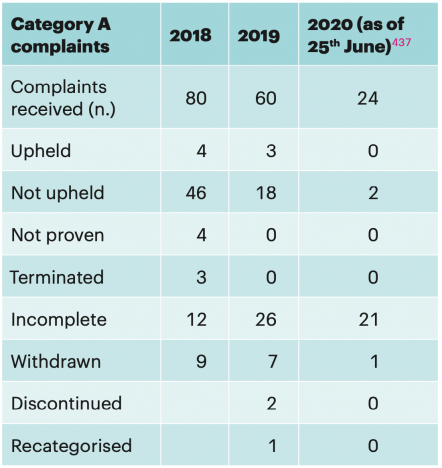Rationale:
Having access to a robust and effective complaints mechanism is of particular importance for individuals detained in closed institutions in order to protect against human rights violations. A number of potential barriers to prisoners making complaints have been identified, including: the absence of an effective complaints system; the slow nature of complaints procedures and response mechanisms; feelings that the problems faced in prison are inevitable; distrust in the complaints system; feelings of shame; fear of reprisal; and absence of legal safeguards.[421]
Current context:
The Committee for the Prevention of Torture (CPT) outlines the basic principles of an effective complaints mechanism as follows: availability, accessibility, confidentiality/safety, effectiveness and traceability.[422] It is important that the prison complaints system meets these principles.
The introduction of a revised prison complaints system in the Irish prison system is overdue. The Irish Prison Service did not meet its own timeline for the introduction of an internal complaints system by the third quarter of 2019.[423] However, measures introduced since reporting on this area in PIPS 2019 include: the establishment of a new Complaints Unit, staff training, and amendments to the Prison Rules, 2007 which are currently being finalised with the expected roll out of the new complaints system before a new timeline of end 2020.[424]
In 2019, there was a 25% decrease in the number of ‘Category A’[425] complaints from 80 in 2018[426] to 60 in 2019.[427] Category A complaints are the most serious form of complaints and are investigated by persons outside the Irish Prison Service.[428] However, a decrease in the number of complaints in a closed setting cannot be assumed to be a positive indicator[429], given the lack of faith and confidence in the complaints system highlighted in various reports.[430] For example, in a chaplaincy report for the Dóchas Centre, it was reported that:
“In most cases, the women involved did not feel safe to make complaints in writing to the governor for fear of further penalisation from the staff involved.”[431]
The CPT outlines the importance of the establishment of a national system for compiling statistics on complaints and outcomes.[432] This would identify trends and inform future policies aimed at improving the functioning of the complaints system. At the time of writing, information related to all other categories of complaints made by prisoners was not made available.
Prison Visiting Committees have a role in hearing individual complaints from prisoners,[433] and if requested, hear these complaints in private.[434] They have a role in seeking informal resolutions, however they do not have the power to formally resolve prisoners’ complaints.[435] There is no information available on how prison visiting committees in Ireland met their duties during the Covid-19 lockdown (13 March 2020 to 29 June 2020). By contrast, Independent Monitoring Boards (the equivalent to Prison Visiting Committees) in the UK published information on alternative remote working arrangements due to the pandemic.[436]
Indicators for Standard:
Indicators for Standard 22
Indicator S22.1:Data on the number of internal complaints, in particular ‘Category A’ complaints (upheld, resolved and dismissed), including the length of time it takes to complete and communicate outcomes of a decision to a prisoner
In 2019 only 5% of Category A complaints were upheld. This equates to a similar number of Category A complaints upheld in 2018.[437]

While 55% of Category A complaints were resolved within 3-6 months in 2019, none were resolved within less than three months, and 43% were classified as ‘outstanding investigations’. 87% of Category A complaints in 2020 were categorised as ‘outstanding investigations’. This delay is attributed to the non-facilitation of investigators accessing the prison in March 2020 during the Covid-19 pandemic.[438] Investigators were reported to have resumed their work in prison in early July 2020.
Progressive Practice:
Progressive Practice-Freephone Hotline[439], England
A confidential hotline was set up by the Independent Monitoring Boards (IMB) in response to Covid-19 restrictions. Similar in function to visiting committees in Ireland, IMBs monitor prisons in England. The hotline was an additional way for prisoners to get in touch and make a complaint, known as ‘applications’, during the Covid-19 pandemic. Prisoners across 13 prisons were able to call from their cell or a communal phone. Lines were open from 7am to 7pm for seven days a week with a backup voicemail service. Calls were confidential and not recorded by the prison service.
Between the launch in April and early August 2020, over 3,080 calls were received; this resulted in 1,200 prisoner applications being sent to and followed up by monitoring boards at a local level.
By August, the scheme had been rolled out to over 60 prisons. Healthcare (physical, mental and social care) was the biggest issue raised by prisoners.[440]
By contrast, data on individual complaints is not published by prison visiting committees in Ireland.
Actions required:
Status of Standard 22: No change
Rationale for Assessment
While there have been some positive changes to the operation of the internal complaints system by the Irish Prison Service, the timeline for the introduction of a new internal complaints system has not been met. Access to a robust internal complaints mechanism is a critical safeguard for the protection of human rights of prisoners at all times but especially during a pandemic, when prisoners have reduced access to regimes and there are fewer external eyes on prisons. New and innovative ways of ensuring confidential access to a trusted complaints system must be delivered to ensure timely, impartial and fair investigations of complaints in the prison system.
| Action 22.1: |
The Irish Prison Service should publish the new internal complaints policy by the end of 2020.
|
|---|
| Action 22.2: |
The Irish Prison Service should introduce a national system for compiling statistics on complaints, relevant proceedings and outcomes in line with a recommendation made by the CPT.[441]
|
|---|
| Action 22.3: |
Prison visiting committees should introduce innovative ways to meet their duty to hear prisoner complaints in private, such as a confidential phone line, and track and publish information on the issues raised by prisoners.
|
|---|


